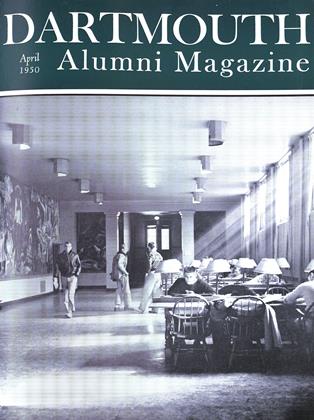BEFORE me as I write there is a NewYork Times headline: Too ManyBores Found Teachings Dean Carman (Columbia) Says Faculties of U.S.Colleges Are Full of Dull, Routine Instructors. Tsk! Tsk! Even worse are the colleges (Dartmouth, of course, excepted) which force students to take courses taught by bores. Which reminds me of a book guaranteed to bore no one, and to be especially delectable (for the first 115 pages at least) to lawyers. So I send a What ho! to Armistead Boothe of Alexandria, Paul Cutler of Chicago, Jim Hodson of Seattle, Frank Horan and Bartow Farr of New York City, Dud Orr, Bill Green, and Bob Reno of Concord, Amos Blandin of Bath, Lanky Langdell and John R. McLane of Manchester, John Dickey and John Meek of Hanover, and to many others, and urge them to read Confessions of an Un-Common Attorney, published by Dent of London. The author is Reginald L. Hine, recently deceased, of Hitchin, England. Part one (Life in the Law) is informative, humorous, shrewd, and contains such sections as "Scandals in the Cellars," "Cantankerous Clients," "Hunting for Next-of-Kin," "Strange Death-bed Scenes," and fortyseven others equally entertaining.
I will gladly loan my copy to the first who asks for it. It is truly a book in a thousand written by a lawyer who became the historian of his native village, and made himself famous as a writer though a practicing attorney for many years. He points out that Sir Edward Coke's rule can no longer be followed: "Give six hours to sleep; as many to the study of righteous laws; for four hours pray; devote two to meals: and what is over bestow upon the Sacred Muses." Hine's life story, and discussions of men he knew in the law, in writing, and in the pulpit, makes reading which will give many an American lawyer a nostalgia for something even if he can't put his finger on it. Maybe it is for the days when there was a little more honor, a little less desire to make a killing at anybody's expense; or maybe it is simply a yearning for justice, truthfulness, and beauty. At any rate Hine has written, in part, a unique book. I came away from it somehow refreshed.
I want to recommend once again to alumni Charles K. O'Neill's novel MorningTime, published in 1949 by Simon and Schuster. It not only deserves a "Wah Hoo Wah," but even more important, deserves to be bought, read, and placed on your shelves to be read again sometime. Into it went an immense amount of work of a most intelligent sort. It has not had the readership it deserves which, alas, is the fate of many good books.
One of my favorite English artists is Muirhead Bone, and one of my favorite writers of the sea is his brother David W. Bone, author of The Brass-Bounder,Broken Stowage, Merchantmen-At-Arms, and other books. These two have combined to write and illustrate a fine book about the English merchant shipmen and ships of World War II from 1939 to 1946. The book: Merchantmen Rearmed (Chatto, 1949). Sir David in World War I had the Cameronia torpedoed from under him in the Mediterranean. This time he was more fortunate, though his voyages, if anything, were far more perilous. From carrying English children to this country to escape the blitz, to troop convoying, and taking part in the invasions of North Africa, Sicily, the Anzio Beach, France, and at the end, Saigon in the Far East, Captain Bone was kept busy for half a dozen years beyond his retirement. The third brother, James Bone, is the author of The London Perambulator, The Perambulator in Edinburgh, and his more recent London Echoing, also illustrated by Muirhead Bone. The Bones are indeed quite a family and well worth your acquaintance.
 View Full Issue
View Full Issue
More From This Issue
-
 Article
ArticleIS TITO COMMUNISM'S LUTHER?
April 1950 By JOHN CLINTON ADAMS, -
 Class Notes
Class Notes1918
April 1950 By ERNEST H. EARLEY, DONALD L. BARR, RICHARD A. HOLTON -
 Article
ArticleTHE COLLEGE
April 1950 By C.E.W. -
 Class Notes
Class Notes1905
April 1950 By ROYAL PARKINSON, GILBERT H. FALL, FLETCHER A. HATCH -
 Class Notes
Class Notes1923
April 1950 By TRUMAN T. METZEL, COLIN C. STEWART 3RD, LEON H. YOUNG JR. -
 Class Notes
Class Notes1929
April 1950 By F. WILLIAM ANDRES, EDWIN C. CHINLUND, GEORGE B. REDDING
HERBERT F. WEST '22
-
 Article
ArticleHANOVER BROWSING
April 1936 By Herbert F. West '22 -
 Article
ArticleHanover Browsing
April 1940 By HERBERT F. WEST '22 -
 Article
ArticleHanover Browsing
March 1941 By HERBERT F. WEST '22 -
 Article
ArticleHanover Browsing
October 1943 By HERBERT F. WEST '22 -
 Article
ArticleHanover Browsing
December 1950 By HERBERT F. WEST '22 -
 Article
ArticleHanover Browsing
November 1952 By HERBERT F. WEST '22
Article
-
 Article
ArticleSOUTHERN CALIFORNIA ALUMNI ASSOCIATION ESTABLISHES VOCATIONAL COMMITTEE
January, 1925 -
 Article
ArticlePROFESSOR DEDICATES SONG TO DARTMOUTH CHORISTERS
May 1925 -
 Article
ArticleNew Executive
June 1947 -
 Article
ArticleNorthwest
January 1942 By C. E. Whitney '24. -
 Article
ArticleFaculty
NOVEMBER 1971 By ROBERT B. GRAHAM '40 -
 Article
ArticleAbout 25 Years Ago
December 1936 By Warde Wilkins '13.

